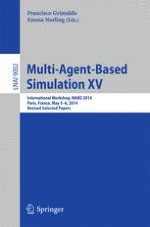2015 | OriginalPaper | Buchkapitel
Partner Selection Delays Extinction in Cooperative and Coordination Dilemmas
verfasst von : Pedro Mariano, Luís Correia
Erschienen in: Multi-Agent-Based Simulation XV
Aktivieren Sie unsere intelligente Suche, um passende Fachinhalte oder Patente zu finden.
Wählen Sie Textabschnitte aus um mit Künstlicher Intelligenz passenden Patente zu finden. powered by
Markieren Sie Textabschnitte, um KI-gestützt weitere passende Inhalte zu finden. powered by
